Iran’s Largest Lake On The Verge Of Disappearing – Official
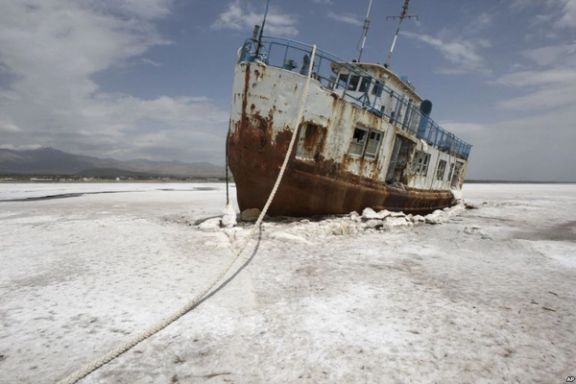
The head of Crisis Management of Iran’s northwestern West Azarbaijan province says Lake Orumiyeh (Urmia) has lost about 95 percent of its water.

The head of Crisis Management of Iran’s northwestern West Azarbaijan province says Lake Orumiyeh (Urmia) has lost about 95 percent of its water.
Amir-Abbas Jafari said on Wednesday that Iran's most famous lake has lost an average of 40 centimeters of its depth per year over the past two decades.
He said drought, water evaporation, mismanagement in development of horticulture and unscientific use of region’s water for growing crops are among the most important factors of Lake Urmia’s gradual disappearance.
The central and provincial governments are determined to revive the lake, Jafari noted.
Experts say groundwater extraction and using the water of the once bountiful Zarrineh Rud − which feeds Urmia Lake − for irrigating apple trees have both contributed to the lake shrinking by nearly 95 percent in volume over the past 20 years. In 2021 alone, more than 100,000 tons of apples of the province’s production went to waste.
Urmia, which is the largest lake in Iran and the sixth largest salt lake in the world began shrinking in the mid-1980s and was in danger of disappearing altogether until recovery plans began to be implemented in 2014.
According to authorities at the government of President Hassan Rouhani, 150 trillion rials – which can be about one billion dollars considering the lower rate of dollar against rial back then – were allocated for the plan in seven years as well as another $10 million aid by Japan and some other amounts by the United Nations Food and Agriculture Organization (FAO) and the United Nations Development Program (UNDP) to save the lake. It is not clear whether or how the earmarked budget was spent.
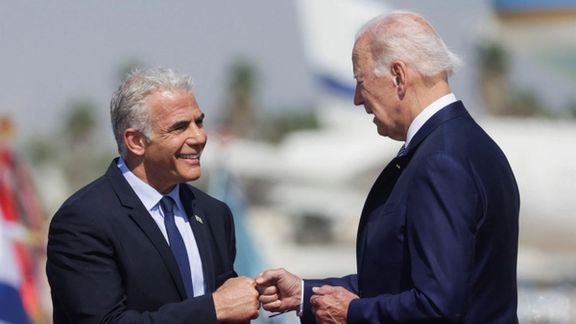
Iran might resort to new methods to “punish” Israel, a website close to its security establishment said on Thursday, as President Joe Biden visits the region.
Nour News close to Ali Shamkhani, the secretary of the supreme national security council also said that “Any steps to disrupt the current security order in West Asia can impact other spheres, such as transportation and transit of energy and add to the existing global food and energy crisis.”
The reference to transportation of energy could be a threat to shipping in the Persian Gulf. Iran in recent and distant past has repeatedly made such threats and in the summer of 2019, attacks took place against many tankers, which were generally blamed on Iran.
The note published by the “international desk” of Nour News also dangled the prospect of continued nuclear talks, as President Joe Biden on Wednesday told an Israeli television that he is willing to use force against Iran “as a last resort.”
The article went on to argue that Israel has always opposed the 2015 nuclear agreement known as JCPOA and is determined to block its revival. In a candid admission of mysterious incidents, Nour News said that Israel has intensified attacks inside Iran in the past year, “to perhaps create chaos and fish in muddy waters…”
Talks since April 2021to revive the JCPOA are now stalled, with Iran speeding up its uranium enrichment, which is seen as a serious step to approach a nuclear weapons threshold.
The United States “has adopted silence toward Israel’s destructive acts,” the article stressed, and has shown its inclination to use these acts to get leverage in nuclear talks. But Washington should know that “Israel’s mischiefs can, under some circumstances, cause loss of control over the situation and lead to the use of different options for punishing the usurping Zionist regime.”
Nour News then picked up the issue of a proposed joint air defense network between Israel and Arab states, ridiculing Israel’s capabilities. It said the current Israeli air defense weapons were for stopping small, short-range rockets and were ineffective against ballistic and cruise missiles, a reference to Iran’s long-range capabilities that have created concern among regional countries.
Nour News had issued a warning on July 10 about US, Israeli and Arab plans to set up a regional air defense system. It said that “the creation of a joint defense pact in the region by the US with participation and hidden management of Zionists is a threatening act.”
The plan to set up coordination between air defenses of Saudi Arabia, Israel, the United Arab Emirates and other allies goes back months. The Wall Street Journal reported in June that a secret meeting took place between top military officers of the countries involved in Sharm El Sheikh, Egypt in March.
Biden’s trip to Israel and Saudi Arabia, his recent tougher stance toward Iran, as wells as talk of steps to establish cooperation between Riyadh and Tel-Aviv have apparently rattled Tehran officials.
President Ebrahim Raisi on Wednesday also warned about a regional alliance aimed at Iran. "if American visits to the regional countries are aimed at strengthening the position of the Zionist regime and normalizing its relations with certain countries, their efforts will not in any way bring about security for the Zionists."

Contradictory statements by Iranian officials this week have observers and journalists scrambling to understand what the government wants to do with imports.
First the news came that the government was planning to restore the policy of offering cheap dollars to importers of essential goods, which would completely reverse its decision in early May to remove the indirect subsidy. Then it was clarified that the government is lowering its calculation for import taxes of some goods to prevent further rise in its already 55-percent annual inflation.
One thing which is clear is that top economic officials are contradicting one another about how they exactly want to mollify the effects of their “major economic surgery” in May that led to prices doubling for many essential goods. Reports say the government has presented a bill to somehow lower cost of imports for consumers.
Removing the indirect subsidy of offering cheap dollars ($1=42,000 rial) to importers has resulted in a massive hike in prices for most commodities including basic foods, medicine and medical equipment, animal feed and many other commodities despite government’s promises that it would not affect the prices of anything other than bread, chicken, eggs, oil and dairy products.
Reportedly, the new bill submitted to the parliament Monday, will lower import taxes for some basic commodities, but the mechanism remains foggy. The most likely decision will be to calculate import duties not by the actual rate of the dollar in the local market, but a fictitious rate eightfold lower, which applied when importers were receiving cheap dollars from the government until April.
Economy Minister Ehsan Khandouzi has explained that the government took the decision to prevent further price hikes in coming months.
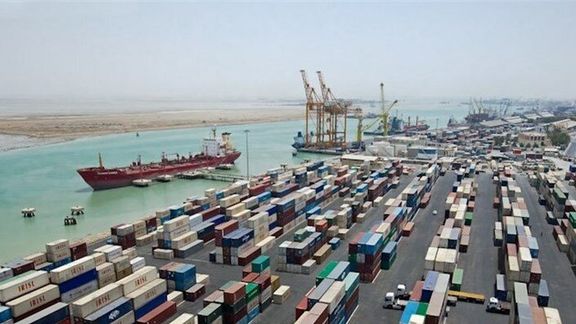
Abbas Argoun, a member of Tehran Chamber of Commerce, told Etemad newspaper that the higher rate in the calculation of import taxes results in cash flow problems for producers and businesses, because imported raw materials become more expensive and production costs rise.
But Argoun explained that lowering import duties now will cut into government tax revenues to the tune of one billion dollars.
Ali Ghanbari, expert in international economy, told Fararu news website that the decision is unlikely to reduce prices of imported goods or the cost of production.
“Instead of such hasty policies, the government must be seeking fundamental solutions to control inflation and high prices,” he said, adding that inflation and prices of basic commodities will continue to increase given the continuation of US sanctions and uncertainties regarding restoration of the 2015 nuclear deal.
Criticizing the government's decision to revive the 42,000 rial rate in import tax calculations, Hamidreza Salehi, a member of Tehran Chamber of Commerce, said to bring prices down the government could have reduced tariffs instead which could cause much less confusion and problems.
To compensate the hike in the prices of essential foods the government is paying around 4 million rials (about $15) to 30 percent of the population at the lowest-income groups, and around 3 million to 60 percent of the population each month. This means the government must spend the equivalent of $850-900 million a month to placate an impoverished population. It cannot afford such a huge cash handout every month and in fact, it has not paid the July stipend.
The special exchange rate was introduced in 2018 to control inflation when the United States pulled out of the Obama-era nuclear agreement known as JCPOA and imposed crippling sanctions on the Islamic Republic.
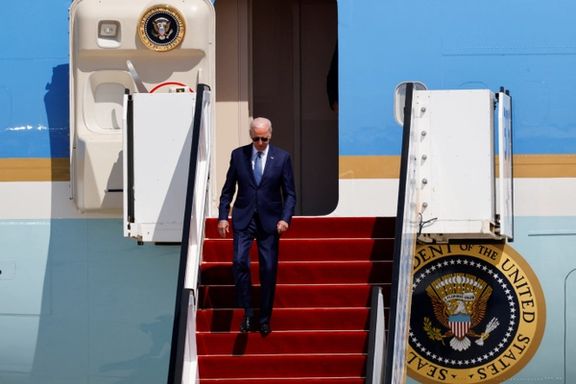
US President Joe Biden reiterated upon arrival in Israel on Wednesday that the only thing worse than Iran now is an Iran with nuclear weapons.”
Biden told Israel’s Channel 12 that he still believes the US should return to the 2015 nuclear deal – formally known as the Joint Comprehensive Plan of Action (JCPOA), noting that the decision is now in Iran’s hands.
About whether the US would use force to stop Iran from attaining a nuclear weapon, Biden said "as a last resort, yes."
He, however, once again rejected Iran’s demand that the Revolutionary Guards (IRGC) be taken off Washington’s list of foreign terrorist organizations as part of any agreement. Asked if he would hold to that position even if it meant no deal, Biden said, “Yes.”
Israel was a staunch opponent of the 2015 nuclear deal and welcomed then-President Donald Trump’s decision to unilaterally withdraw from it, which led to its unraveling, a decision Biden calls a “gigantic mistake” that accelerated Iran’s progress towards a nuclear weapon.
He declined to comment on any discussions with Israel about using military force against Iran, but assured Jerusalem that he will work with whomever is elected as Israel’s next prime minister, even Benjamin Netanyahu, with whom he has had strained relations. “We’re committed to the state, not an individual leader.”
“In order to stop regimes like Iran, economic sanctions are not enough, diplomatic sanctions are not enough. There is no way to stop Iran without a credible military threat,” said Netanyahu, who was not part of the official greeting ceremony for the US president but did shake his hand.
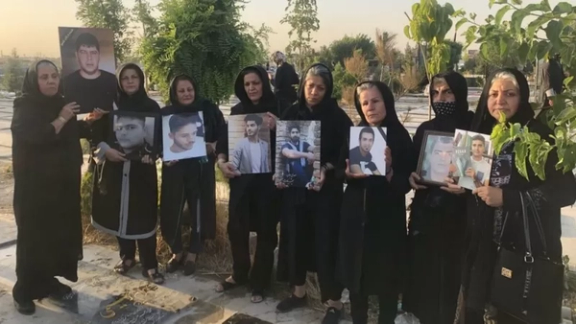
The United Nations office of Human Rights has expressed concerns about Iran’s recent detention of film directors, civil society activists and family members of victims of human rights violations.
The Office of the High Commissioner for Human Rights (OHCHR) told Iran International on Wednesday, “So far in July, over 13 people have been arrested... We note with concern the continued crackdown against civil society actors and their fundamental rights in Iran.”
“We are particularly concerned that detentions are being made on the basis of overbroad national security and espionage charges, which would render them arbitrary under international human rights law,” the office said in response to Iran International’s Maryam Rahmati.
“Civic and democratic space continue to be restricted, with human rights defenders and civil society actors operating within a coercive environment where violations are committed with impunity,” the OHCHR said, referring to the latest report by UN Secretary General António Guterres on the human rights situation in Iran presented to the Human Rights Council on 21 June.
Also on Wednesday, the US State Department’s Bureau of Democracy, Human Rights, and Labor condemned the increasing arrests of rights activists by the Islamic Republic, saying “The recent arrests in Iran are a reprehensible crackdown on peaceful dissent, including against political activists, filmmakers, and brave women protesting mandatory hijab laws. The United States condemns Iran’s continued efforts to prevent the exercise of freedom of expression.”
Earlier in the day, Iran’s government and military officials warned the population over disobeying hijab rules, one day after many women took off their headscarves in public.
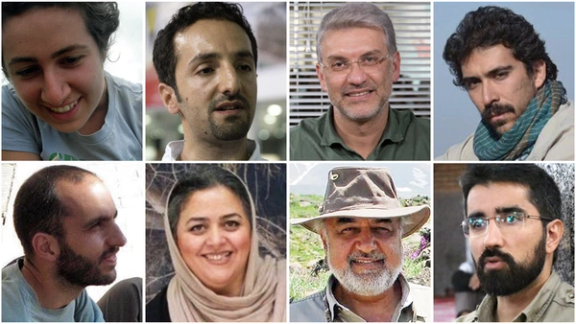
About 2,800 environment protection academics, lawyers and artists have written to Iran’s chief justice, asking him to reconsider the case against a group of environmentalists detained since 2018.
In their letter to Gholamhossein Mohseni Ejei, the public figures and civil society actors said that given the replacement of the Revolutionary Guard (IRGC) Intelligence Organization Chief Hossein Taeb, their cases should be reviewed and called on him to consider the legal possibilities of a parole for them.
The signatories emphasized that the four-member committee of the former administration to examine the issue, comprised of ministers of interior, intelligence and justice as well as the legal advisor to the president, had found no evidence to prove charges of espionage against them.
Nine environmentalists and ecologists were arrested in 2018 on charges of espionage. All were members of the Persian World Heritage Foundation, an NGO dedicated to conserving wildlife in Iran, and are serving sentences from four to 10 years. Kavous Seyed-Emami, the NGO’s founder, was found dead in his cell two weeks after his detention, with the authorities reporting suicide and the family denying the claim.
Human Rights Watch has reported the detainees have been subject to ‘torture’ during incarceration, and that no evidence of any crime has been produced in public, with convictions obtained in special security courts.
Iran International published a compilation of four investigative reports on torture and abuse of these prisoners on June 21.